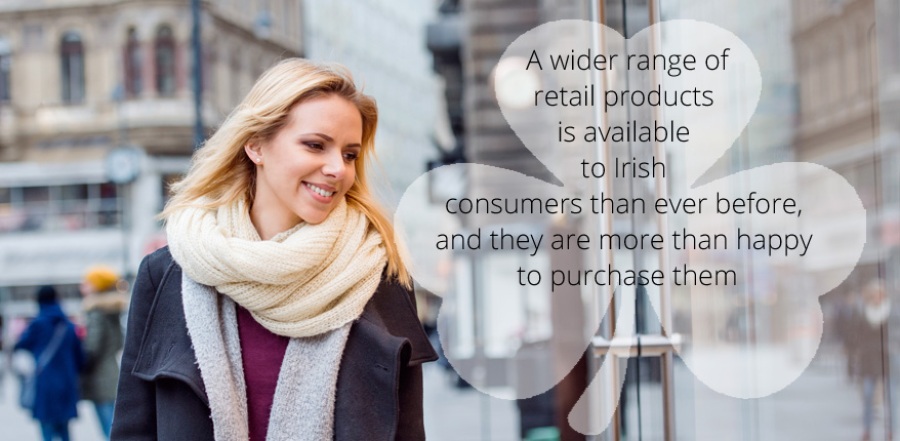
2016 was a successful and promising year for the Irish retail industry. Having thoroughly recovered from the low point of the 2008 recession and its lingering after-effects in the following years, the industry has since grown from strength to strength, expanding into unprecedented levels of income and product diversity. A wider range of retail products is available to Irish consumers than ever before, and they are more than happy to purchase them; while the retail industry is still dominated by supermarkets, it is increasingly possible to generate substantial turnover in the leisure or video game industries. In addition to this, political factors are highly likely to have a noticeable impact on the industry in the coming months and years. All of these various factors mean a great deal for the Irish retail franchise industry, as shall be discussed below.
Retail trends: an overview
To begin with, what is the Irish retail industry like? How big is it? Where do Irish people most like to shop, and what sorts of things do they buy? Consider the following facts and figures:
- The Irish retail sector employs almost 275,000 people, roughly equal to the total number of those employed in IT, agriculture, forestry, fishing and the financial and insurance sectors.
- There are 42,000 retail and wholesale businesses operating in Ireland.
- The Irish retail industry is the biggest consumer of Irish food and drink products, purchasing over €5 billion worth of goods annually.
- Data from 2012 indicates that the combined Irish retail and wholesale sector generated €5.7 billion in taxes.
- In 2012, the combined Irish retail and wholesale sector paid out approximately €8.3 billion in wages.
- The Irish retail industry has grown by more than 20% since 2010, after a brief dip from 2011-12.
- In 2016, nearly half of all investment spending in Ireland (greater than €1 million in value) was in the retail sector.
- 83% of retail businesses in Ireland are Irish-owned and Irish-operated.
- 75% of Irish retail businesses are family-owned enterprises.
- The retail industry in Ireland is dominated by supermarkets: the leaders in market share areDunnes Stores, SuperValu, Tesco, Lidl and Aldi.
Retail is a popular sector for franchising also: dozens of retail franchises are registered with the Irish Franchise Association (IFA), and several retail franchises are currently advertising with us here at Franchise Direct, including Experimac, Friking and The Zip Yard. Below, we shall examine some prominent trends affecting the retail industry at present and in the near future, and some areas which have seen particular growth.
Online shopping vs. physical shops
The importance of online shopping to the Irish retail industry is difficult to overstate. The service has undergone impressive growth in the past decade, with the proportion of Irish people who reported having shopped online in the past twelve months increasing from 31% in 2007 to 44% in 2012. Moreover, this upward trend is continuing to climb ever higher, with 94% of 2016’s Internet users in Ireland making use of online shopping, and commentators estimating that, by the year 2020, Irish customers will spend up to €14.1 billion a year on commerce sites.
Online shopping has become not just bigger, but also much broader. Where once it was confined to leisure and luxury items (still the most popular category among Irish users, with 82% and 76% of Irish online shoppers purchasing flights and hotel bookings online, respectively), now even supermarkets routinely offer the service. Indeed, the proportion of Irish consumers who use online shopping to order their weekly groceries has more than doubled since 2007. In cases such as entertainment media, no physical products are even sold at all.

Naturally, the meteoric ascent of online shopping has led many commentators to pose the question – in a technologically advanced society in which kitchen fridges will soon be able to order the weekly groceries automatically, does a place still exist for traditional brick-and-mortar supermarkets anymore, never mind shops in major shopping streets? The question is a difficult one to answer, but high levels of footfall in all of Ireland’s major cities’ shopping streets strongly suggests that physical shops will be sticking around for some time at least (even if their primary function might be for consumers to browse before purchasing their desired items online, as reported by 86% of Irish consumers).
Brexit
As of April 2017, any informed reader is likely exhausted of reading about the potential impact of Brexit upon a given economic sector, but nevertheless, the UK’s unexpected vote to leave the EU in June of last year has massive and far-reaching implications across any number of industries worldwide. The Irish retail industry is no exception. Clothes retailers such as Next are anticipating significant price increases in many of their products to maintain profit margins, with the price of shirts and skirts to increase by as much as 5%. At the same time, many are anticipating staff layoffs in supermarkets and department stores, as companies endeavour to maximise productivity and minimise losses.
Article 50 has not been triggered yet, but already the downturn in the value of the pound sterling immediately after the referendum saw consequent decreased spending by British tourists in Ireland during the holiday months of July and August. British tourists’ spending may have decreased by anywhere from 12 to 20% compared to the same period in the previous year. The pound’s value has significantly recovered in the months since August, which should hopefully correct this trend; but it remains to be seen what impact the UK leaving the EU will have on the Irish tourist industry, and by extension on the retail industry. Britain’s exit from the EU may also have major negative effects on imports from the UK to Ireland, and on purchases made online. Before article 50 is triggered, the reality of the situation is that the future of the retail industry, as with numerous other economic sectors, is uncertain and doubtful.
Video games
One of the retail sectors which saw the most growth between 2015 and 2016 was video games. This should come as no surprise to any keen-eyed observer, as in recent years video games have grown into one of the biggest entertainment sectors in the world (valued at $99.6 billion in 2016), and are by some estimates even larger than comparable sectors such as film or television. The video game sector is highly diverse, encompassing traditional computer games played on desktop computers, home-based video game consoles, handheld video game consoles, and the recently successful mobile games sector.
Despite the recent growth of the sector, many commentators foresaw a decline in brick-and-mortar video game shops this decade, as physical media became less popular than digital downloads and online games. However, paradoxically, some brick-and-mortar video game shops have seen growth in the same period, owing to the popularity of video game reselling. The biggest success story in the video game reselling sector is CeX, a retail franchise which buys and sells second-hand video games, consoles and related paraphernalia, and which currently operates in ten countries, having licensed dozens of franchisees. Moreover, video games are sufficiently mainstream that they are no longer seen as the sort of product only available in specialist shops, and are increasingly commonly available in mainstream retailers such as Tesco, Argos or Amazon (the Amazon marketplace likewise allows users to sell games second-hand). This all suggests a very promising outlook for the various economic sectors in the video game industry.
Below, we shall discuss a few of the most prominent retail franchises currently operating in Ireland.
Irish franchises
The Zip Yard
The Zip Yard is a retail franchise currently advertising with us here on FranchiseDirect.ie, and is one of the most recent companies to join the Irish franchising landscape. The company was founded in 2005 after identifying a gap in the market, noting that very few body shapes conform to the ‘standard’ European sizes found on the high street; and also that many customers no longer have the time or skills to tackle even the simplest of hems, let alone risking damage to a favourite or expensive garment. Originating in Ireland, The Zip Yard grew into a franchise with shops all over the country and entered the British marketplace in early 2010. Recent years have seen the company going from strength to strength, opening branches up and down the length of Ireland and further afield, and carrying out alterations for famous clients, including sportspeople such as Rory McElroy and Conor McGregor.
Eason’s
Eason’s is one of the most iconic of all Irish retail companies, and is arguably the country’s signature bookseller’s chain. The company was originally founded in 1819 as Johnston & Co., and since that time it has observed some of the most exciting events in Irish history, growing to become the primary supplier of books, newspapers and magazines in Ireland. Charles Eason and his son acquired the business from W.H. Smith in 1886. During the 19th century, the company was directly involved in the industrial and literary revolutions occurring throughout the country. The company has only recently (as of 2005) started offering franchising opportunities to independent retailers, separate from its main stores. The company’s upward streak is continuing ever higher, as it recently opened two new branches (in Dublin and Limerick, respectively) with attendant creation of 30 new jobs and announced a new managing director in Liam Hanly.
Day-Today
Day-Today is a retail solution designed by Musgrave (who also run several other supermarket chains) that allows convenience stores to compete more effectively and profitably in their market, while still maintaining their independence. Key benefits of being part of the Day-Today group include a vibrant brand image, competitive pricing, loyalty rebates and a low marketing fee. Musgrave has had great success in recent years, with their recent acquisition of the Superquinn brand, extensive rollout of its SuperValu and Centra chains across the country and, as noted above, SuperValu making up the second-largest supermarket share in Ireland.
Summary
The Irish retail industry is faced by considerable challenges as we continue into 2017; although recent years have been successful and promising, the future is still as uncertain as ever. The industry will have to grapple with a diverse range of changing factors, such as technological development and innovation, and the political climate in which it operates. But the ongoing growth in a broad sweep of different economic sectors indicate that the industry is more than capable and willing to rise to the challenge.














